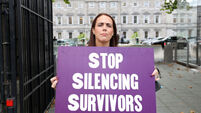Noeline Blackwell: Pandemic may be ending, but the sexual violence epidemic is relentless

During lockdowns, many people had neither physical space nor head space — which was particularly challenging for people who have been suffering abuse. Stock picture: Thinkstockphotos
Dublin Rape Crisis Centre’s annual report 2020, launched this morning, features a line graph which shows when people contacted the national 24-hour helpline that we run. From a high point in the month of January 2020, it goes to its lowest point in February and March, rising again quite steeply in the summer months, and then levelling off. This graph tells us that fewer people contacted the national 24-hour helpline in those first weeks of Covid-19 uncertainty and rapidly changing information than at any other time during the year.
Granted, our counsellors and therapists noted that those who called us or availed of our therapy services needed us more than they ever had before. The calls, messages, and video appointments showed that when the country’s general anxiety about Covid-19 was added to the specific trauma that had been inflicted by sexual violence, many felt desperately isolated and anxious, needing our help to ground themselves and reach a place of calm. This meant that people engaged with us more intensely and the continued concentrated support of our dedicated and experienced staff and trained volunteers was crucial.
















